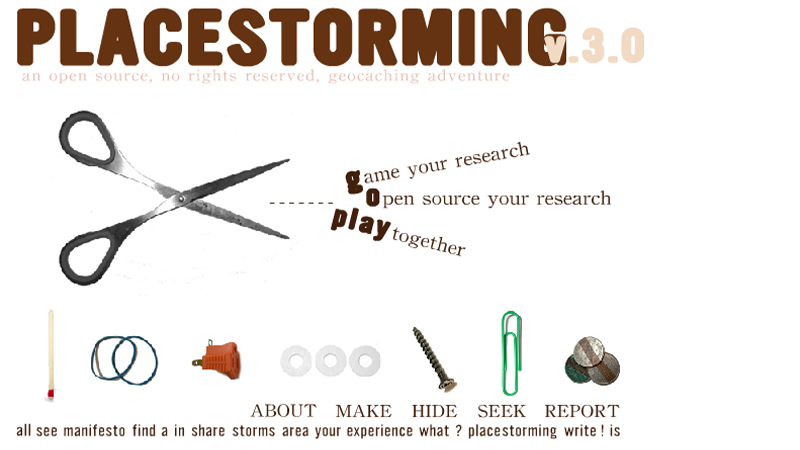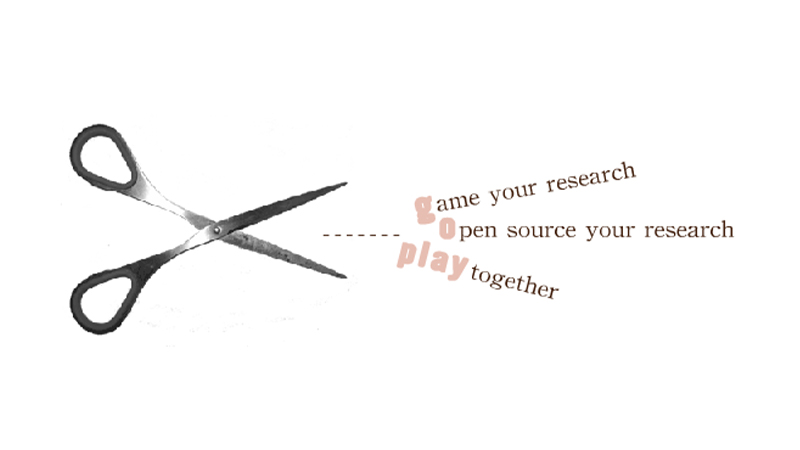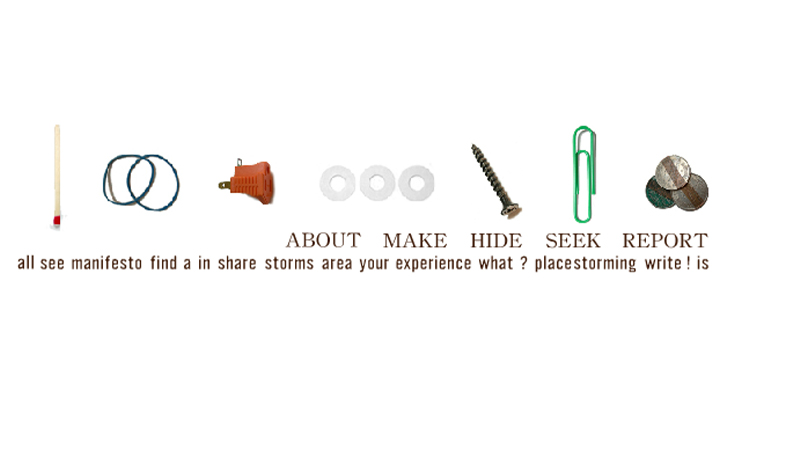PlaceStorming poses the question, "[i]f your research were a superhero, what kind of superhero would it be? [This project] begins with the seemingly dubious union of academic writing and pervasive, mobile gaming. Not only does the game put the 'site' back into 'cite,' but it perforates the walls dividing academia and the world at large, inviting academicians to relinquish the sanctity of their written texts and gamers to play with those texts, transforming their meaning through an unlikely process of disassembly, recombination and discovery.
McGonigal's work poses perhaps the most challenging reconfiguration of scholarly practice contained in this issue of Vectors, but it is not to be dismissed out of hand. Those who are involved in game studies have been fighting an uphill battle for legitimacy during the past decade or so of this nascent field's development. Most have attempted to position games on a safe continuum with related forms such as cinema, literature or performance, laboring to retool the conceptual frameworks from those fields to bring insight to the structural, narrative and social dimensions of gaming. McGonigal's approach differs in that it insists on being both formally and conceptually innovative; suggesting that, indeed, the theorization of emergent gaming practices is most productively enacted through a 'playful' mode of engagement as well as a serious one.
McGonigal dares her users to dismiss this method, which takes literally academia's often-stated but seldom-realized goals of collaboration and relevance outside the walls of the university. For those who are willing to traverse these familiar boundaries, PlaceStorming serves as a reminder that spaces are also places and that abstract coordinates are rooted in physical locations, which are both culturally diverse and geographically specific. Ultimately, McGonigal's argument offers a convincing counterpoint to conventional wisdom regarding mobile and pervasive technologies, which would have us believe in the spatially dislocated nature of life in an increasingly mobilized world." – Vectors Journal Editorial Staff
Author's Statement
"PlaceStorming v. 3.0 asks you to trust a cut-up, the Dadaist practice of playfully re-arranging and juxtaposing texts to uncover hidden meanings, to speak for your research. So I trust the cut-up below to speak for mine.
*
You are locked in a room imagining, while we are in the streets doing.
I want to give you a feel for the city. I want to give your research a feel for the city. Your research is a public good, like the water fountains.
We can call this PlaceStorming a team building activity, or something. A 'performance.' A 'game.' Gives it a bit of a chance art feel.
What you had was fine. But I played with it.
Humanities needs a playful way of attracting the attention of others sharing the same space. Research that engages all senses: touch, sight, sound, smell and taste. Research that is easily sharable with friends. That can interact with the environment.
Use a parking garage, an elevator, a coffee shop, a phone booth, a public square, a municipal building, a court house, a mall, a river front, a light rail train, street, a sidewalk, a movie theater, a hotel lobby, a skywalk, as a broadcast medium for your intellectual property. Welcome to the public domain!
We are trying to create a joint article, community, brainstorming on the go. Public, not private. Research you are able to pass onto others . . . not just for self. Perform and inform! Share with others, anywhere but the home. Release it. Let the public interpret your work.
Your article is pre-written and pre-recorded and when you cut word lines the future leaks out.
Does collective wisdom emerge from massively multiplayer games?
Express concerns: I'm a little worried. The 'experimental' nature of this, I'm not sure of. If I give them my work, I'm not sure they will read it. They will take it and not engage. They will take it and pervert my ideas. People are fundamentally not going to get this.
Not everyone wants to play.
I refuse to let you have it. I'm not leaving my room. My work wishes to be left alone. My work comes with a couple of strings. I control exactly what it means.
What does it mean?
PlaceStorming means: you cut the strings.
PlaceStorming means: make your own familiar strange.
Do I need any 'training' in this? I have no idea what I'm going to do.
Come prepared to be mobile and outdoors. Work fast. Use the manifesto. It isn't the best map, but it is the one I have.
Report from playtesting: We needed the magic shield and the clog of invisibility at the same time. Just to show we aren't insane. Just more of how we want them to think different. I don't want them to be thinking about anything but being a PlaceStormer until we get back. I thought it was rather odd until you said the secret words: 'Wow, I can't believe this actually works!'
I could have done more but I think this is probably enough.
So back to school work for you young lady - no more fun and games.
Why are you on here?
What do you think?
Fresh eyes would be helpful. Strange spaces would be helpful. Feel free to cut. Just change it. Co-conspire.
Make it better.
*
This statement was composed by cutting up and reassembling bits from 315 emails, 97 Microsoft Office files, and 109 Web histories. These 521 originary documents represent the intellectual and creative source code of this particular iteration of the PlaceStorming project, which began in January 2004 as a research collaboration between game designer/theorist Jane McGonigal and design anthropologist Ken Anderson." -- Jane McGonigal, from Vectors, Volume 1, Issue 2, Spring 2006
Playtester's Statement
"Monica Stufft is a performance studies researcher at the University of California @ Berkeley, where she is writing a dissertation about the living and working conditions of American theater women at the turn of the 20th century. In March of 2005, she participated in a playtest of PlaceStorming v 3.0.
As a PlaceStormer, Monica used her work on American theater women to create the profile of an imaginary new breed of superheroes called the 'Sister Chorines.' She created a superhero manifesto for the Sister Chorines by playfully quoting, or 'cutting up,' Domesticating Showgirls: Historicizing the Ziegfeld Girls, her own conference paper for Performance Studies International. With two other PlaceStormers, Monica role-played as the Sister Chorines in downtown Providence and performed a site-specific public intervention. She then geocached her manifesto for future PlaceStormers to find and to perform.
What follows are some of her notes and images from the playtest.
*
It felt like an act of violence, cutting up my work, forcing it into another context.
I resented the parameters of the superhero manifesto. They required me to deconstruct carefully crafted sentences, sentences I had struggled over and polished until they were exactly what I wanted to say. Now I was wrenching words from those sentences and giving them a strange new form, a form I was sure couldn't come close to articulating my argument. I had struggled to make that argument fit the 10 page limit of a conference paper. Here, I had only 10 lines.
It was challenging. I hit a wall more than once. I felt a tinge of regret each time I sacrificed the complexity of a thought to fit the tiny space and right part of speech for a particular field in the manifesto. I kept asking myself: What could playing with the most formal expression of my research project accomplish?
*
I was still struggling with my manifesto when our playtesting group started packing up supplies and preparing to leave the classroom. I'd named my superheroes the 'Sister Chorines' . . . it had a nice ring to it. ('Chorine' is a term for a woman who was a member of a chorus, and my research focuses on the communities and networking practices chorines created at the turn of the 20th century.) I'd called the Sister Chorines' superhero tool 'Midnight frolics' . . . that was the name of the nightly midnight show Ziegfeld girls put on before Prohibition. But I couldn't figure out what to use as my superheroes' call to action. What would the Sister Chorines yell in a public space? They weren't so much speakers as dancers. Finally, just to finish up, I jotted down something relating to the chorus girls' kick lines — 'Get a leg up!' There was no good reason for picking this phrase over the many others.
I had no idea what it would yield.
*
We were going to perform, and then hide, our manifestos with a prop. The prop would represent a kind of 'supertool'.
We were asked to choose our superhero tools from a variety of everyday objects arranged into a PlaceStorming array: balloons, sunglasses, little diaries, colored electrical tape. My first impulse was to use the sunglasses, but even as I was reaching for them, I realized that it didn't feel quite right. I followed some unconscious instinct and grabbed the electrical tape to stash with my manifesto. I didn't have a good reason at the time. It just felt right.
*
I had never heard of geocaching before, and it was my first time using GPS equipment. It was incredibly exciting. I forgot my frustrations with my own manifesto as I helped others perform theirs. After an hour, we meandered off campus and into the surrounding downtown area. I felt that this move to a more public setting was more fitting for my superheroes, as 'increased visibility' and 'social interaction' were important terms in my Sister Chorines' manifesto. I studied the urban landscape for a site that seemed suited for the Sister Chorines' mission: 'to join the ranks of a political vehicle, with a sense of genuine fellowship.'
As we walked down the hill from the university, we chanced upon a square with a fountain in the center. There were groups of children playing around and on the fountain. The ring of cement encasing the water made an excellent playground for the children. So why not join the children in a genuine fellowship of play? We could use it as our PlaceStorming playground. To kick off our intervention, we 'Got a Leg Up' by hopping onto the edge of the fountain, and began discussing the best way to use the Sister Chorines' supertool in that particular setting.
*
The Sister Chorines' super power was to be 'friendly and encouraging to all newcomers.' So we decided to approach the children. We did this with a bit of nervousness, understanding that the adult chaperones would be skeptical of our presence and of our interest in the children. We told the children's chaperones that we wanted to ask the children to decorate us with the electrical tape, to make art on us, anywhere they wanted.
What began as hesitant introductions ended in a melee of tape as the children decorated our clothing with colorful patches. One girl marked her name on my arm in yellow while a house was constructed out of blue, green, and red. My fellow 'Sister Chorines' ended up as brilliantly decorated as I was — face, hair, shoes, hands. We now had attractive alternatives to our somewhat solemn conference garb—and 'making attractive alternatives' was part of the Sister Chorines' modus operandi, according to the manifesto I'd created. So was 'increased visibility' — and we definitely achieved that, as well.
We thanked the children and their chaperones, and we told them that we'd wear their artwork for the rest of the day. The children were doubtful at first and then, when they finally believed us, jubilant. They had expected us to take the tape off immediately. Instead, we promised to take their artwork back to Brown and with us for the remainder of our day.
*
As my fellow PlaceStormers and I walked back to campus, we talked about the significance of letting the children mark us. I told them more about my paper and explained that an important aspect of my scholarly work is to reframe the way that other scholars understand the professional and personal lives of, and relationships between, working chorus girls. An argument commonly made by historians is that the chorus girls were entirely structured, controlled, and disciplined by their male directors, producers, and audience members. In my writing, I refute this position and argue instead that through their participation in theater, women formed communities and networks that were not entirely guided by the masculine presences around them, but rather had a life of their own.
My fellow PlaceStormers pointed out that while we had structured the experience of performing our manifesto, operating as a kind of director, the children had truly left their mark on us by surprising us with what they came up with. They had an active role in performing the manifesto, a role that touched and changed us. It made me realize how important it was for me to let my work have a life of its own, that I am in my historical approach to chorus girls already actively arguing for the importance and validity of a multi-authored experience. And with our superhero electrical tape, we had truly (and literally) 'patched together new communities' through the 'collaborative action' of the children on our clothes and bodies.
When I made my decision about what prop to use, I didn't really have a reason for the switch at the time. But its significance to my work became evident in the PlaceStorming process. I learned (or, perhaps, relearned) how important physical connections between individuals are. The sunglasses would have facilitated viewing, while the tape allowed for literal physical connections, for a tangible and tactile experience in the field.
*
Instead of viewing from a distance, a position that we so often occupy as scholars, I was able to experience my work from a new, more physically engaged, perspective. And I had to remain open for how the children engaged with the manifesto, just as I must remain open to hear how the women experienced their networks and communities.
PlaceStorming allowed me to re-vision my project, to feel the energy of creative engagement with the work and to create communities and networks of my own. I left the conference with a deeper understanding of my work and why I had been drawn to it in the first place. But I also learned how to be a more responsible historian as I go into the archives more willing to be touched and changed by what I encounter.
*
Through play, PlaceStorming helped me rediscover the heart of my research project. I came out of the playtest with a stronger sense of the personal stakes of the research.
I realize now that PlaceStorming facilitates the same reflective process in writers that I encourage my acting students to do when they develop a scene. In the acting studio, I ask students to find their motivation -- to uncover core goals of their characters, and to make those goals meaningful to them on a personal level. In the same way, PlaceStorming asks writers and public actors to understand the motivations of a research project, to find and embody the core goal of a research project. It is, perhaps, a kind of method acting for researchers.
*
I've left my work and the superhero tools for you to find. I left my manifesto underneath a trash can, in a little alcove, a kind of cement cave. It was the only sheltered space in that open square, I didn't want to leave it exposed, I wanted to leave it protected.
It would be wonderful to see what happens when you perform the manifesto. I know that I'll get new insights every time someone leaves their mark. I'd also love to see what happens if you create your own manifesto and join this network of superheroes. So I say to you, 'Get a leg up!'
*
N 41.82527 W 071.40780." -- Jane McGonigal, from Vectors, Volume 1, Issue 2, Spring 2006
Project Credits
"The PlaceStorming project began as a research collaboration with Intel design anthropologist Ken Anderson, who co-developed the original Place Storming experience and first coined the term 'place storming' to describe our site-specific approach to imagining future mobile-social technologies. Our first two playtests in Seattle (beta) and Portland (v. 1.0) were made possible through support and funding from Intel. Many thanks to all of the playtesters in Los Angeles (v 2.0) and Providence (v. 2.1), and many many thanks to Kiyash Monsef, Ian Bogost, Julian Bleecker and Monica Stufft for their invaluable feedback, participation and co-conspiracy throughout this iterative process.
— Jane McGonigal, May 19th, 2008
Jane McGonigal www.avantgame.com
Game Designer/Author
Jane McGonigal is a Ph.D. candidate in performance studies at the University of California at Berkeley, where she is also a member of the Alpha Lab for Industrial Engineering and Operations Research. She teaches game design (San Francisco Art Institute) and contemporary games culture (UC Berkeley), with a focus on how these two fields intersect with public policy, urban planning, live performance and theatrical practice. She recently collaborated on network installations commissioned by the Whitney MuseumÂ’s digital artport (Demonstrate, 2004) and the Los Angeles Museum of Contemporary Art (PlaceStorming, 2005). She was a member of the I Love Bees design team at 42 Entertainment that won both the 2005 Innovation Award from the International Game Developers Association and the 2005 games-related Webby Award from the International Academy of Digital Arts and Sciences. Her next SuperGaming project, she hopes, will take place in Antarctica.
Raegan Kelly
Site Designer/Programmer
Co-Creative Director and site designer for Vectors through the Difference issue (5), Raegan Kelly has worked as an interactive designer, programmer, cinematographer, and screen printer for the last 15 years. Raegan is leaving to focus her creative energies on a solo venture in innovative, functional and non- toxic material design. She has a BA from UC Berkeley and an MFA in Film from CalArts.
Craig Dietrich www.craigdietrich.com
PHP MySQL Support
Craig teams with scholars and designers on Vectors projects solving creative and information challenges, and creates tools for online art & humanities production. His recent collaborations include the Mukurtu Archive and Plateau People's Web Portal content manager based on Aboriginal cultural protocols, ThoughtMesh, a semantic online publishing system, the Dynamic Backend Generator, a MySQL-based relational data writing canvas, and an upcoming metadata server for artworks and artists. He is presently in production of Magic, a project documenting innovation in humanities-centered interactive media, and USA Today, a multimedia project focusing on trans-nationalism's consequences. Craig is an Assistant Professor of Cinema Practice at USC's Institute for Multimedia Literacy, part of the School of Cinematic Arts, where he teaches project design and creative hypertext. He is also further immersed in network art and culture as a researcher at the University of Maine's Still Water lab." -- from Vectors, Volume 1, Issue 2, Spring 2006
1 COPY IN THE NEXT
Published in Spring, 2006 by Vectors in Volume 1, Issue 2.
This copy was given to the Electronic Literature Lab by Erik Loyer in November of 2021.
PUBLICATION TYPE
Online Journal
COPY MEDIA FORMAT
Web



